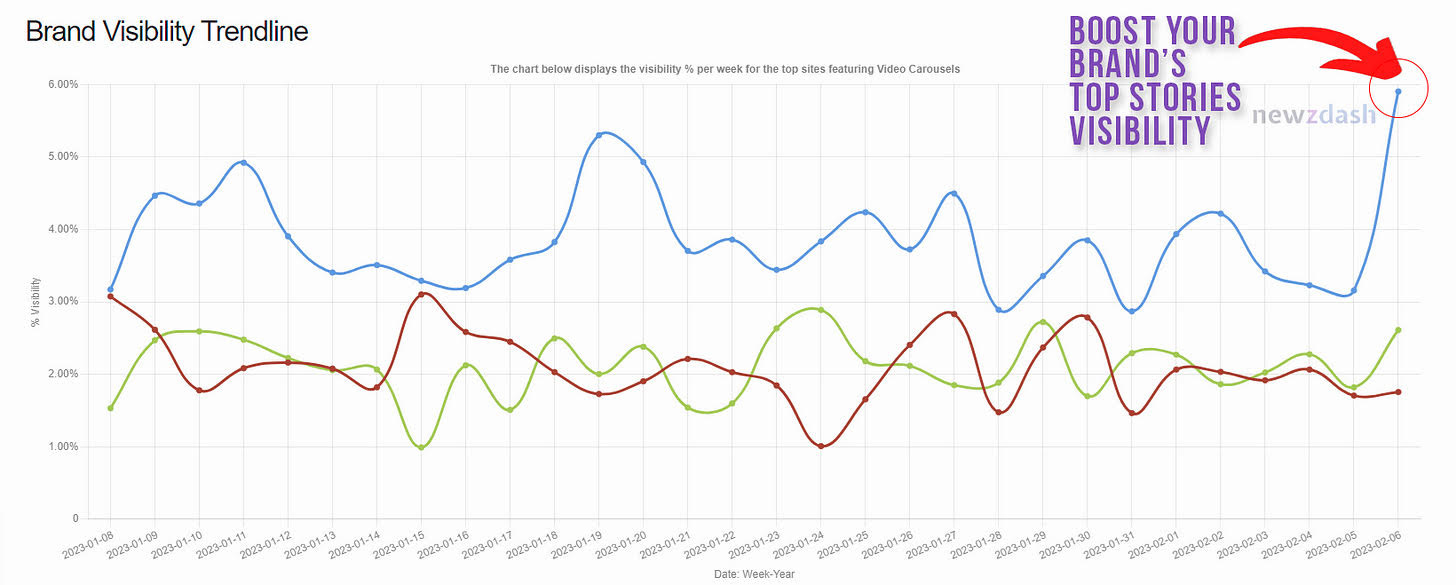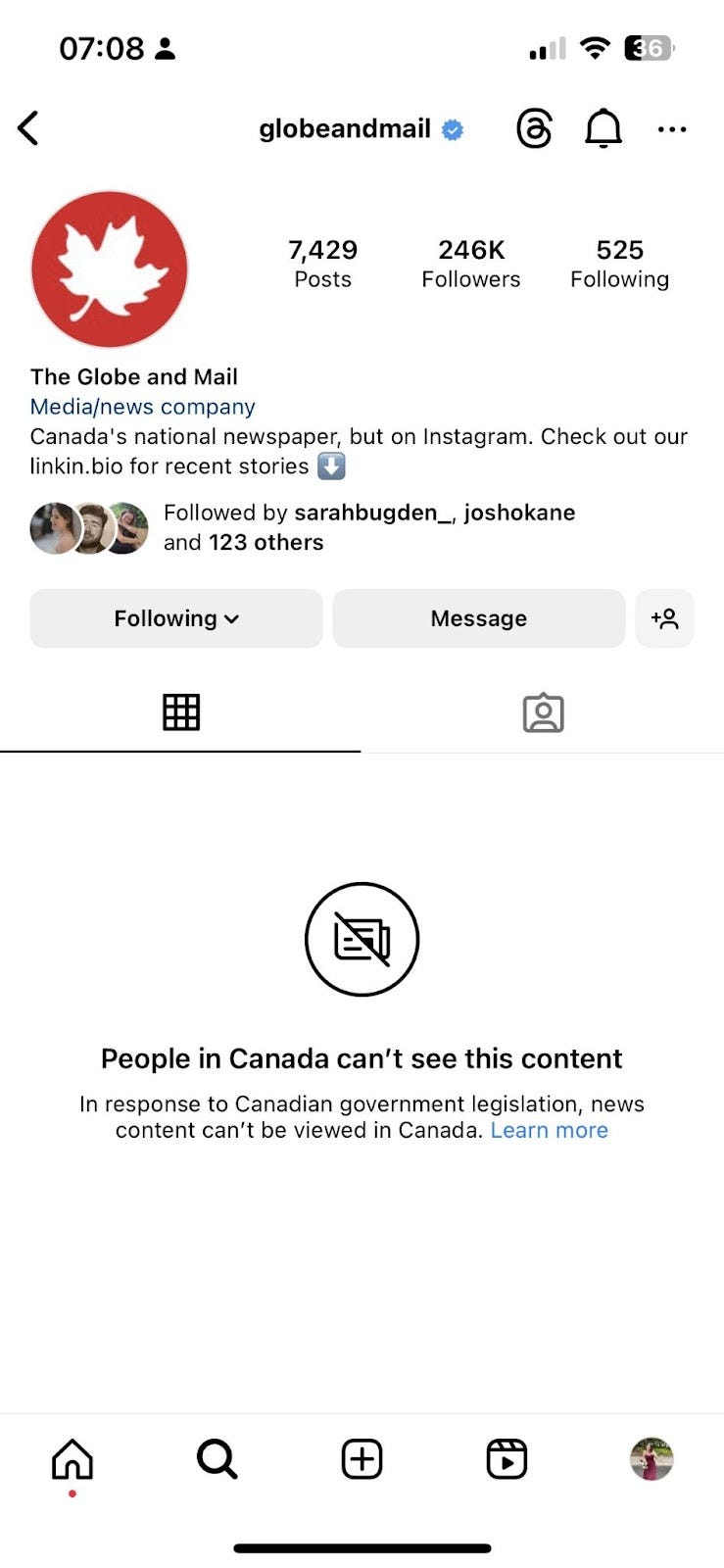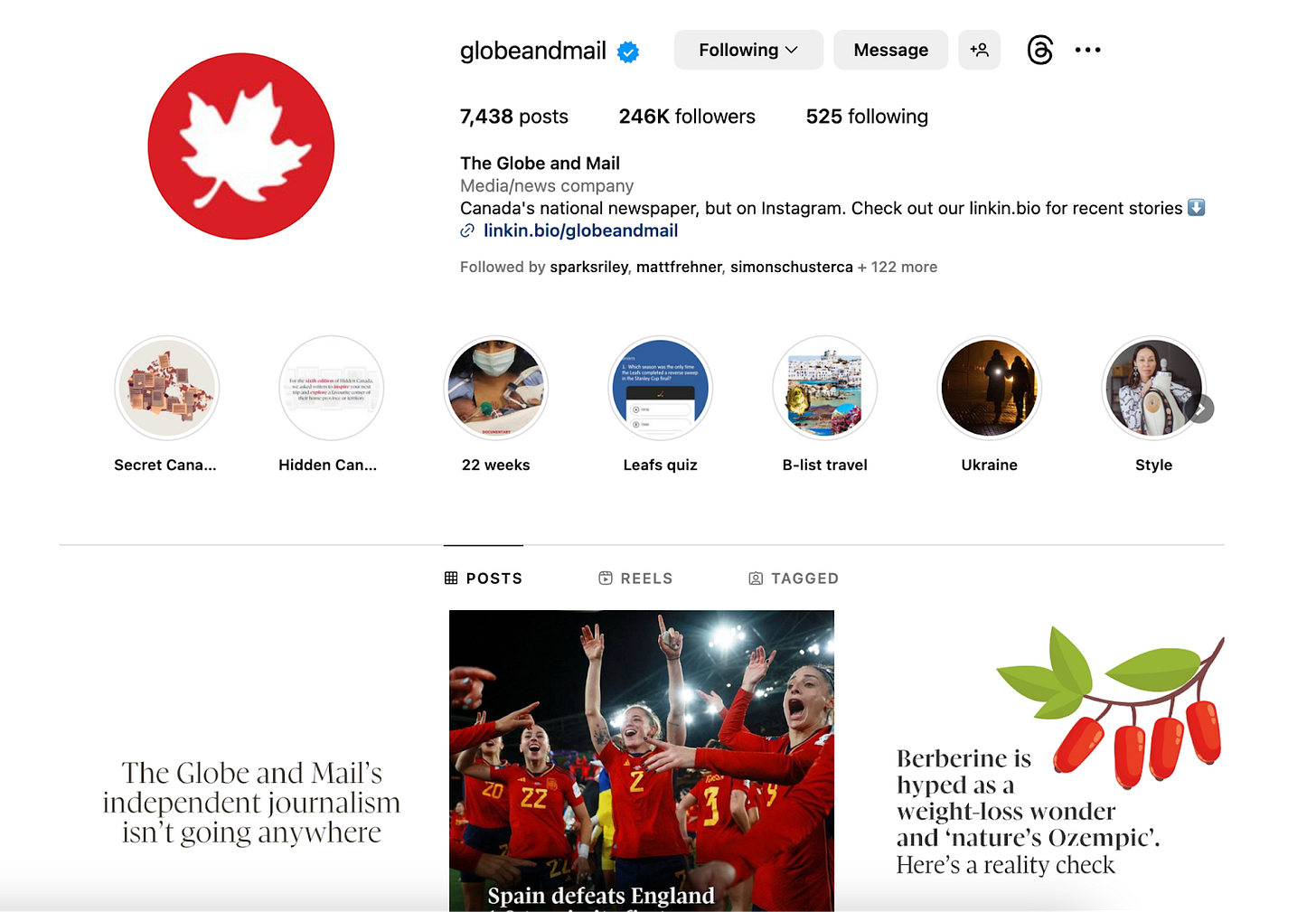What we’re reading: Bill C-18, Google, Meta and the value of news
Jessie and Shelby go through the newest developments in Canada's fight with big tech as well as a recent study that shows the true value of news in search
#SPONSORED
Breaking News: GDdash Wins Best SEO Innovation at European Search Awards 2023!
🏆 Exciting Update! Introducing GSC Simplified: automated keyword clustering, evergreen content drop detection, and Algorithm Update Traffic Analysis. Unlock Discover Competitive analysis & author topical authority. Simplify your GSC data and gain actionable insights instantly. Don't miss out!
Hello, and welcome back. Jessie and Shelby here, back from Sad Dad Rock O’Clock (The National performing in concert here in Toronto). Tears were shed (by Jessie), merch was purchased (by Jessie) and overpriced bevies were consumed. Blame the 9:30 p.m. (in the evening!!) start time for any typos in this edition.
This week: It’s the dog days of summer. We take a look at what’s happening with Bill C-18, aka the Online News Act in Canada, the value of journalism in Google and what’s next for publishers.
Next week: Are you or your colleagues heading to ONA in Philadelphia? One half of WTF is SEO? will be at the conference, too! We’re organizing a small news SEO meetup; fill out this Google Form to stay in the loop. If you see Jessie, say hi! She might have a tote for you. 👀
Join our Slack community to chat SEO any time
Let’s get it.
In this issue:
What’s happening with Bill C-18 in Canada?
What’s the value of news in Google?
What else we’re reading
BILL C-18 / META
Meta bans news on social feeds; Canada reels during devastating wildfires
As a reminder, Canada’s government passed Bill C-18 or the Online News Act in June 2023, legislation that attempts to make tech giants, like Meta and Google, pay Canadian publishers for content on their platforms. The framework would ensure “news media and journalists receive fair compensation for their work.” The bill forces companies to “make fair commercial deals'' with Canadian publishers whose content appears on their platforms.
The legislation became law this summer, but won’t fully take effect until the end of the calendar year. However, Google and Meta say the legislation is a link tax; Google has said it would “break the way the internet works.”
Earlier this month, Meta officially began blocking news on its platforms. When looking on mobile in Canada, consumers can’t see most news publishers — regardless of origin — on their feeds. That includes Canadian outlets like The Globe and Mail, but also international publications such as The New York Times, The Guardian and niche sites like The Narwhal. Some profiles that share Canadian news — but may not be considered a “news outlet” — such as Toronto blog 6ix Buzz TV, are still accessible on Instagram.
In an extremely surprising development, student media also fall under Meta’s ban. The Cord, the student newspaper at my alma mater, Wilfrid Laurier University, is not accessible.
Additionally, it seems like sports hasn’t been affected at all. Canadian sports outlets Sportsnet and TSN, along with Bleacher Report and The Athletic, are both visible on Instagram. Meanwhile, I can access the Los Angeles Times, but I can’t access CNN’s Instagram account.
Pro tip: While the above sites are blocked in Canada on Facebook and the mobile app for Instagram, most of them are still accessible via the desktop app for Instagram. It seems Meta did not block access there, likely because there aren’t a lot of users that use the desktop version.
All tests above were done on Instagram and Facebook in Toronto, Canada, so they may be different in other areas depending on the parameters Meta has set in place.
I wrote a Twitter/X thread on this topic if you’d like to dive into it more.
We’re currently witnessing the dangerous effects of this news ban in Canada. This week, evacuees of two catastrophic wildfires had no access to news on their social feeds. Major wildfires in Yellowknife, Northwest Territories and Kelowna, British Columbia forced people to other platforms, especially in Yellowknife where local media is the main sharer of information. There are also concerns over the volume of reliable coverage on these fires, as well as awareness across the country for casual news consumers. The Canadian government has called the ban “reckless” and demanded Meta lift it so people and publications can share information.
Unlike Meta, Google has had talks with the government in hopes of finding a solution. According to the CBC, Google's president of global affairs said they will “plan to participate in the regulatory process” and will “continue to be transparent with Canadians and publishers as we move forward.” But if a deal is not made by the end of the year, the search engine will follow Meta’s lead and remove links to Canadian news from search, Discover and Google News.
GOOGLE NEWS
How valuable is news in Google’s search ecosystem?
What’s the value of news in search? That’s the question a recent study by FehrAdvice & Partners in Switzerland tried to answer. It turns out: Google may need news more than they let on.
The answer is more interesting — and surprising — than you might expect. The visibility of news in the search ecosystem might be perceived as primarily a benefit to news organizations. Publishers receive visibility and reach readers who might not otherwise know about their website. Search is a key acquisition channel for the top-of-the-funnel audience, and Google traffic has long been worth the investment — of our time, our resources and willingness to follow what it dictates (cough, AMP, cough).
However, the study found taking news links out of Google Search results in users trusting the ubiquitous search engine less. This study — which comes as Canada (and other countries) are working to enact legislation forcing tech giants to pay for news — demonstrates that without news links, Google is a much less useful and much less valuable platform.
As The Rebooting’s Brian Morrissey summarized: “Taking news content out of its search index puts a big dent into the entire premise of universal search.” It might be indirect, but it’s a powerful set of data for publishers and policymakers.
How the study worked: The Swiss study had 1,573 representative respondents. Users were split into two groups: Those with journalistic content in search results and those without journalistic content. Participants were then asked to search for relevant information on specific topics. The study observed differences in the behaviour and perception of each group over the course of two months in early 2023.
Here are some key findings from the study:
The market share of Google searches using publisher content results in an estimated revenue of about $440 million per year. The study found that fair compensation for the value that media content provides to Google search would be about 40 per cent of total revenue.
For the majority of the study's participants, Google is the “first point of contact with the information ecosystem” and readers often don’t click beyond the first page of results because their needs are met. That underscores the inherent value in having news in search: Readers use Google to find information, without the need to go elsewhere because their information needs are met within Google.
Without news in Google, readers will go elsewhere. Users will turn to other search engines or platforms where the information they need and the content they want is available. That might mean visiting publisher sites directly, turning to news aggregators or using other search engines. If publisher content keeps readers using search, that’s significant user retention Google isn’t directly paying for on their platform.
Informational searches make up about 55 per cent of all queries on the internet (the rest are navigational or commercial/transactional, where journalism often provides less utility).
Participants in the study preferred search results with publisher content. The group with journalists content had higher success rates in search and better overall satisfaction.
The study goes on to argue that to sustain the information ecosystem, Google should distribute revenue generated fairly to all parties involved.
The study concluded that journalism in Google’s results improves the utility of search, but that Google benefits more financially than publishers. As Tech Policy wrote, “This study confirms the crucial role of news content in the Google search engine, as users prioritize quality, completeness, trust and up-to-dateness when seeking information.”
Where Google has previously indicated journalistic content is of nominal value in search, this study demonstrates the opposite. Or, as Tech Policy put it, the study shows how that view is “myopic and disingenuous.”
EVEN MORE READING
🔗 GSQI's Glenn Gabe tracked more than 3,000 syndicated news articles to determine the impact on indexing, ranking and visibility, as well as traffic across Google’s surfaces. He concludes that syndication problems for news might be worse than publishers think.
🤖 Press Gazette: The New York Times is reportedly considering legal action against OpenAI to protect intellectual property rights for its content. Meanwhile, the Associated Press signed a deal that would allow OpenAI to train its models on the company’s archives.
✅ John Shehata: A step-by-step guide for optimizing your news article template page.
🔎 Lily Ray provided a demo of SGE while Browsing, a new product from Google Labs that generates summaries of content and navigates to different sections of the page.
🗞️ Lily Ray also investigated what kind of headlines do the best in Google Discover versus regular search using ChatGPT after noticing a pattern.
🤑 And another from Lily Ray: Will SEO be heavily tied to influencer marketing in the future? Seems that way.
📈 Andy Chadwick: How we increased traffic by 110 per cent in four weeks by redirecting 15 million URLs.
#SPONSORED - The Classifieds
State of Digital Publishing: Double the organic traffic to your digital media and content property with SODP's Publisher SEO online course. Use code WTFISSEO for 20% off any plan!
Get your company in front of more than 7,400 writers, editors and digital marketers working in news and publishing. Sponsor the WTF is SEO? newsletter!
What did you think of this week's newsletter?
(Click to leave feedback.)
THE JOBS LIST
These are audience jobs in journalism. Want to include a position for promotion? Email us.
State of Digital Publishing is hiring for three roles: SEO Team Lead for South East Asia, Head of SEO and Publishing SEO Team Lead.
Ian Helms is looking for a writer to update 100 pieces of content.
Condé Nast is hiring a temporary SEO Manager for September 2023 to January 2024 (Remote U.S. or U.K., or close to New York or London office).
Catch up: Last week’s newsletter
Have something you’d like us to discuss? Send us a note on Twitter (Jessie or Shelby) or to our email: seoforjournalism@gmail.com.
Written by Jessie Willms and Shelby Blackley










